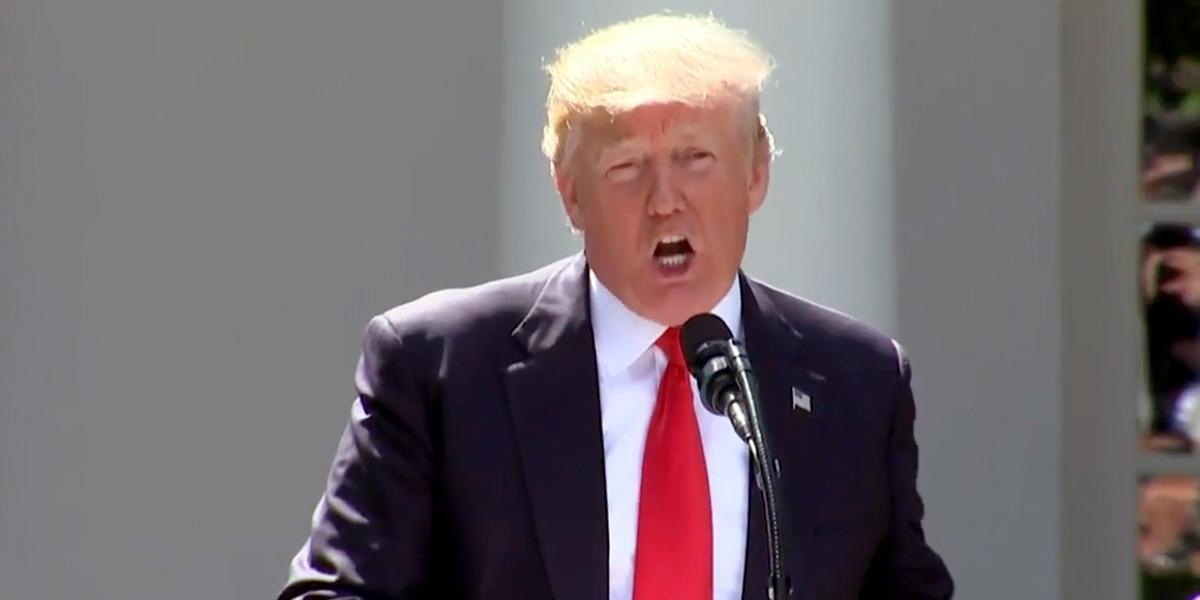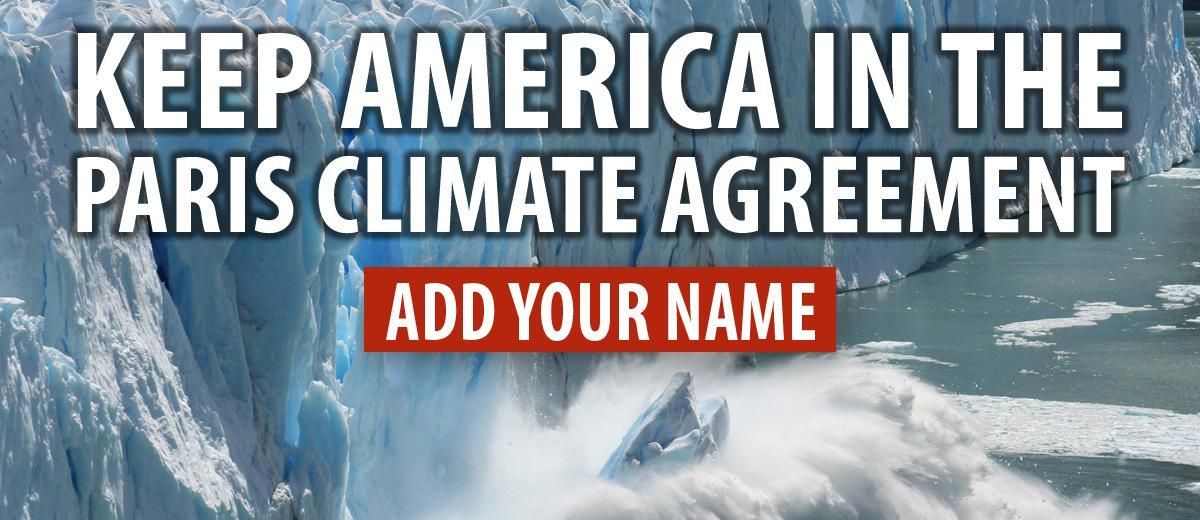

As you’ve probably already heard, President Trump announced today that he will withdrawal the U.S. from the Paris climate agreement.
The 2015 accord, signed by nearly 200 countries, commits nations to voluntarily cut greenhouse gas emissions to limit global warming to 1.5 degrees Celsius above preindustrial levels to prevent catastrophic climate change.
In anticipation of Trump’s withdrawal from the agreement, world leaders reaffirmed their support to reduce global emissions and lead on climate action. Now, the U.S. joins Syria and Nicaragua as the only countries not to back the accord.
Trump’s remarks, which he made from the White House Rose Garden, included:
“In order to fulfill my solemn duty to protect America and its citizens, the United States will withdraw from the Paris climate accord but being negotiations to reenter either the Paris accord or an entirely new transaction under terms that are fair to the United States. We’re getting out. And we will start to renegotiate and we’ll see if there’s a better deal. If we can, great. If we can’t, that’s fine.
“The United States will cease all implementation of the nonbinding Paris accord. As someone who cares deeply about our environment, I cannot in good conscience support a deal which punishes the United States. The Paris accord is very unfair at the highest level to the United States.
“The agreement doesn’t eliminate coal jobs, it just transfers those jobs out of the United States and ships them to foreign countries. This agreement is less about the climate and more about other countries gaining a financial advantage over the United States.”
Watch Trump’s announcement here (starts 37 minutes into the video).
Here are my 21 favorite responses to Trump’s announcement. Share your response in the comments.
1. “Removing the United States from the Paris Agreement is a reckless and indefensible action. It undermines America’s standing in the world and threatens to damage humanity’s ability to solve the climate crisis in time. But make no mistake: if President Trump won’t lead, the American people will.” — Former Vice President Al Gore
2. “Consider the implications to history if Great Britain turned back from the Industrial Revolution in 1800. President Trump has made the most reckless and irresponsible decision by a U.S. president since the Iraq war. America has lost her moral authority and any claim to being an exemplary nation. With this pen stroke, we have ceded our position as the world’s leader to China. The generations will pay for our stupidity.” — Robert F. Kennedy, Jr.
3. “With or without Washington, we’re working to aggressively fight climate change.” — New York Gov. Andrew Cuomo
4. “Seeing the Earth from 250 miles up gives you a new appreciation for the environment. Pulling out of the #ParisAgreement is irresponsible.” — Astronaut Mark Kelly
5. “Donald Trump is showing us the art of breaking a deal. By abandoning the Paris Agreement, this administration will further perpetuate environmental racism and climate injustice against Indigenous peoples experiencing the worst effects of climate change across the globe … Backing out of this agreement continues a long history of broken promises and threatens the vital and sacred life cycles of Mother Earth.” — Indigenous Environmental Network’s Executive Director Tom BK Goldtooth
6. “Today, the future livability of our planet was threatened by President Trump’s careless decision to withdraw the United States from the Paris Agreement. Our future on this planet is now more at risk than ever before. For Americans and those in the world community looking for strong leadership on climate issues, this action is deeply discouraging. Now, more than ever, we must be determined to solve climate change, and to challenge those leaders who do not believe in scientific facts or empirical truths. It is time for all of us to stand up, organize, fight back, and channel our energy into grassroots political action.” — Leonardo DiCaprio
7. “This is a decision only someone in a billionaire’s bubble would make … Trump is an out of touch billionaire selling out America—and the world—for profit.” — Greenpeace USA Executive Director Annie Leonard
8. “Affirmation of the #ParisAgreement is not only about the climate: It is also about America remaining the global leader.” — Mitt Romney
9. “Trump doesn’t speak for the majority of Americans with this decision. And we’re going to make sure the world knows that.” — Oil Change International
Trump doesn't speak for the majority of Americans with this decision. And we're going to make sure the world knows that. #ParisAgreement pic.twitter.com/JqViTxbGTt
— Oil Change International (@PriceofOil) June 1, 2017
10. Trump would rather honor an empty campaign promise to the coal industry rather than honor a promise to the world on climate #ParisAgreement. — Sen. Ed Markey
11. “Trump’s extremism has isolated us from the global coalition we helped to create—with China, Germany, India, Japan and 190 other countries—to fight the central environmental challenge of our time.” — Natural Resources Defense Council President Rhea Suh
12. Trump’s action won’t reverse the momentum. Progress will continue. The American people will not turn our back on climate leadership. The consequences are simply too dire.” — Earthjustice President Trip Van Noppen
13. “What an embarrassing sight. History will remember.” — Shannon Gotto
https://twitter.com/shannongotto/statuses/870359522975657984
14. “Rather than supporting a sustainable future for humanity, growing our economy and creating jobs, President Trump is putting the United States on the wrong side of history.” — Waterkeeper Alliance Executive Director Marc Yaggi
15. Trump’s endless crusade to cripple any efforts to protect people and the planet from industrial pollution is the kind of stuff only seen from zealots who close their eyes to science and common sense. — Environmental Working Group’s President Ken Cook
16. “We will harness public outrage into meaningful on-the-ground action. By working at the local and regional level, communities can organize for powerful and lasting change, forcing elected officials to choose a side: that of Trump and his fossil fuel billionaire cabinet, or that of the people fighting for a stable climate and an economy that works for everyone.” — 350.org Executive Director May Boeve
17. “Generations from now, Americans will look back at Donald Trump’s decision to leave the Paris agreement as one of the most ignorant and dangerous actions ever taken by any president.” — Sierra Club’s Executive Director Michael Brune
18. Next steps: #Impeach
Next steps: #Impeach @realDonaldTrump, #FlipTheHouse, re-join the #ParisAgreement, & undo all the other stupid shit this idiot has wrought.
— BadHombreLands NPS (@BadHombreNPS) June 1, 2017
19. “Today is a dark day for the millions of people around the world who have rallied around the noble and necessary goal of ending the climate crisis.” — Climate Reality Project’s President and CEO Ken Berlin
20. What alternate reality nightmare is this where the EPA chief applauds US exit from the #ParisAgreement? We will #resist you @EPAScottPruitt. — Sierra Club’s Beyond Coal Director Mary Anne Hitt
21. “Donald Trump turned the fate of the planet into a reality T.V. show hosted live from the White House Rose Garden. Trump’s grand reveal surprised no one; once again, he elevated Big Oil over our environment and the well-being of humanity.” — Friends of the Earth, U.S. President Erich Pica
22. “With this reckless rejection of international climate cooperation, the administration took a giant step toward turning our country into a rogue nation. Most Americans want global action against global warming, but Trump’s foreign policy seems aimed strictly at appeasing coal companies and the oil industry.” — Center for Biological Diversity’s Executive Director Kierán Suckling

 233k
233k  41k
41k  Subscribe
Subscribe 
